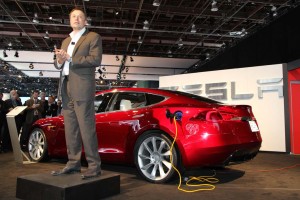
Brother, can you spare a billion? Tesla CEO Elon Musk shows off a prototype Model S at the Detroit Auto Show, last January.
Apparently, $1.5 billion doesn’t go quite as far as it used to – or so Elon Musk, the Internet entrepreneur and electric vehicle visionary, has discovered.
The South African-born Musk made $1.5 billion, a few years back, selling his share of the online Paypal service, then pumped a sizable portion of his fortune into Tesla Motors, the California-based electric vehicle maker, as well as SpaceX, a private rocketry firm. But as Musk acknowledged in an interview with TheDetroitBureau.com, last year, the auto business is far more expensive than it initially might seem.
And that is leaving him dependent upon the kindness of strangers, now that his fortune has largely run out, borrowing money from family and friends, according to various reports out of Silicon Valley.
Musk confirmed his financial problems in a court filing in which he stated, “About four months ago, I ran out of cash.”
His worsening financial situation raises serious questions about the viability of Tesla. The company has been surviving on the modest revenues generated by its initial product, the 2-seat Roadster, while it develops the Model S sedan, due to market in a couple years. While Tesla has built up a base of investors, including some of Google’s founders, most of its funding came directly from Musk – who has been hoping to recover his investment once the carmaker stages its long-awaited IPO.
So far, Tesla has run up losses of $261 million, including $55.7 million last year alone. The company slowed its cash burn rate to just $8.4 million during the last quarter, but continues to invest heavily in the Model S project.
It will also have to pump money into a new assembly plant. Last month, Musk and California Gov. Arnold Schwarzenegger appeared together to announce that Tesla was taking over the NUMMI assembly plant, in Fremont, to build its new sedan. The facility was run as a joint venture between General Motors and Toyota. GM abandoned its stake under bankruptcy protection, last year, and Toyota subsequently decided to close NUMMI.
At the news conference, Musk was also joined by Toyota CEO Akio Toyoda, who revealed a new partnership between the troubled Japanese giant and the California battery car maker. Toyota plans to invest $50 million once Tesla goes public.
Tesla has also formed an alliance with Daimler AG, and will provide powertrain technology for the German maker’s Smart electric vehicle, among other projects.
Tesla has also tapped into the same pot of federal aid that has helped its start-up rival, Fisker Automotive. Last June, it received a $465 million loan from the Department of Energy for the development of high-efficiency vehicles.
The automotive business has a history of bringing ambitious entrepreneurs to their knees. Henry Ford failed twice before making it big in the business, but GM founder Billy Durant was forced out when the company faltered, back in the 1920s, eventually surviving by running a bowling alley in Flint, Michigan.
California ship-builder Henry Kaiser thought he’d shake up the established order, after World War II, and, at a meeting with his better-established Detroit counterparts boasted that he was prepared to invest $1 billion, a seemingly huge sum at the time. “Congratulations. Give that man one chip,” the then-chairman of General Motors reportedly shot back. Kaiser’s car business soon foundered.
In last year’s conversation with TheDetroitBureau.com, Tesla’s Musk said that getting the world to recognize the value of electric vehicles was something he noted he has wanted to do since his teen years. And he insisted he wasn’t worried about using up his fortune.
“Tesla will do well as long as we make good products,” he said. “To say a car company is the best way to get a return on your investment is absurd, though Tesla will do well for its shareholders. And regardless of the outcome, it won’t change my lifestyle one iota.”

One WHITE chip. Give that man one WHITE chip.